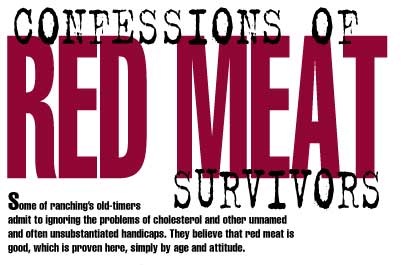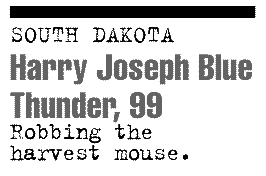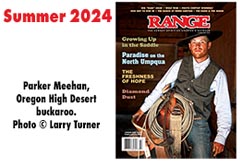|
 
Rancher Harry Joseph Blue Thunder was born May 5, 1906, to John and Annie (White Buffalo Woman) Blue Thunder on the Rosebud Indian Reservation in South Dakota. Harry grew up in an era of hard times for the Lakota people as they were going through many adjustments from a complete change of lifestyle. The United States government enforced the need for Indian children to attend school and would not allow children to attend powwows, presumably to prevent them from learning more about their culture. Harry attended school at St. Francis Mission where children were left throughout the school year.
"There was no TV or movies at that time," Harry says. "Then the flu came. There was no vaccine, no pills, nothing. They just made you stay in bed with no medicine. You just laid there until you were dead. Some of the children died in the dormitory, and the folks would come and take the body home."
Harry was in a coma for four days when his folks came and took him back to camp at Ring Thunder. "The medicine man was there," Harry continues. "He was all the doctor they had then. He saved many lives, including mine."
Harry says they should have closed up the school and allowed the children to get medical help, "but it was much like the Waco, Texas incident...a good example of policies and procedures that harmed the people they intended to serve."
Two of Harry's sisters died in the flu epidemic at the Bishop Hare School for Girls in Mission.
"The police came, then the girls were brought home in a box," he says sadly. "It was rough going at that time."
The family lived in a log house that was heated with a wood stove. They gathered chokecherries, buffalo berries, currants, June berries and raspberries. The berries were ground with a stone grinder, pressed like hamburger patties and laid on a canvas to dry for the winter. They also gathered wild potatoes from the sandbars at the river and would find gallons of wild beans by following a mouse trail to his cache.
"We always robbed the harvest mouse," Harry confesses.
The family ate prairie dogs, badgers, coons, squirrels, rabbits, prairie chickens, quail, pheasants, geese and cranes.
"We took care of ourselves as best we could," he says. "When a beef was butchered, nothing ever went to waste. It was all dried. The women would take sinew from a place along the backbone and use it for sewing moccasins. I have ate beef all my life and still do."
Harry has always been a man of great faith. In the 1930s, his father gave him two acres of trust land to build a church. Harry held morning services and, during Lent, he rode circuit on horseback spreading the Gospel among his people. In 1934 he became a Catholic Catechist, teaching people the fundamentals of the Catholic faith. Perhaps the proudest moment of Harry’s life was when he received the Lumen Christi Award from the Catholic Church in 1992. He was flown to Boston to receive the award, which was quite an experience for a man who rarely ever left the confines of his reservation.
By Yvonne Hollenbeck Harry Joseph Blue Thunder was an honored guest at the 2002 Rosebud Sioux Tribal Fair. When he was a boy, a medicine man saved his life.
Summer 2005 Contents
|
|



